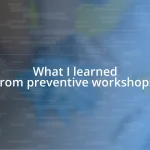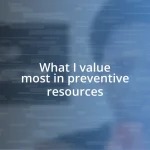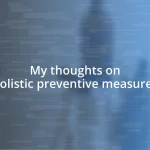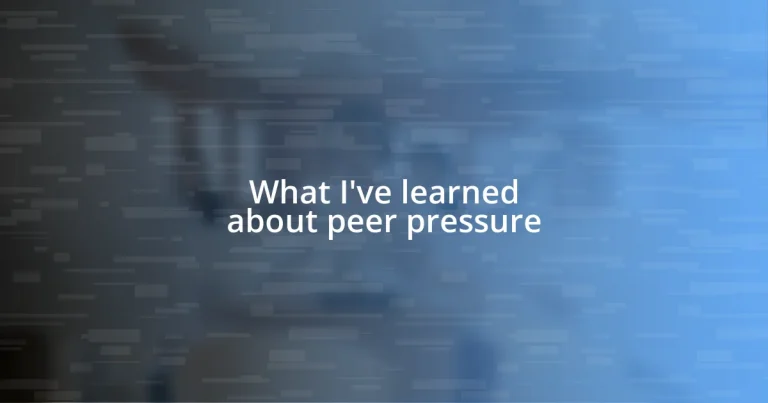Key takeaways:
- Peer pressure can have significant effects on individuals, leading them to compromise their values and desires for acceptance and conformity.
- Understanding different types of peer pressure—direct, indirect, positive, and subtle—can help individuals navigate their influences effectively and make empowered choices.
- Building self-awareness, confidence, and effective communication skills is crucial for resisting peer pressure and maintaining personal values in social situations.
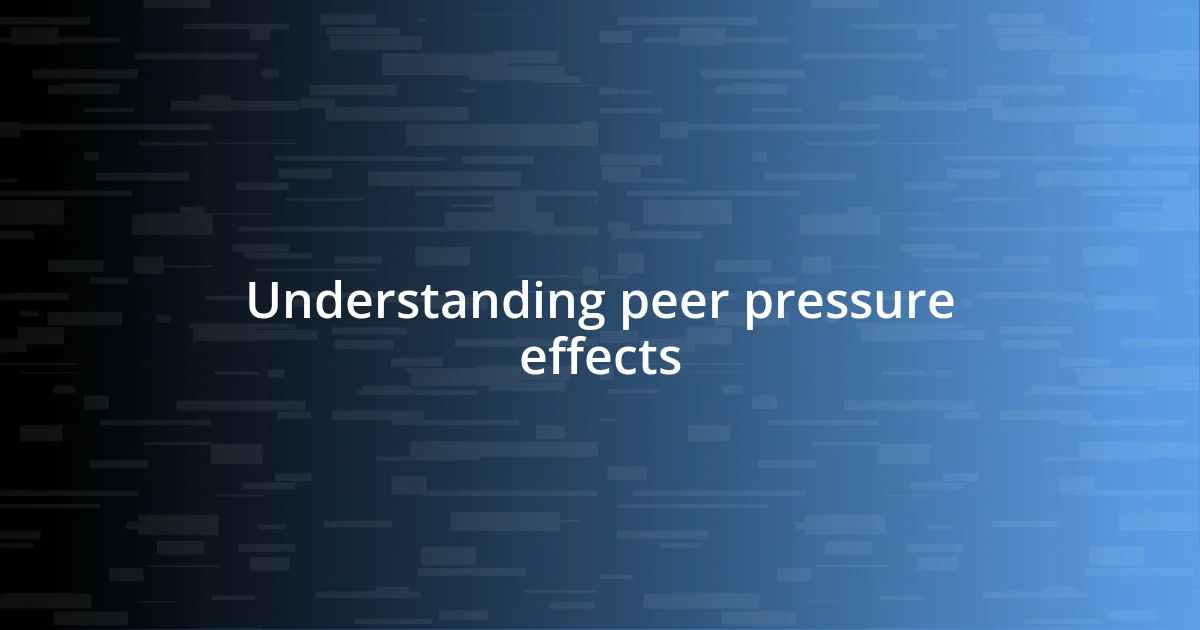
Understanding peer pressure effects
When I think about the effects of peer pressure, I can’t help but recall a time in high school when my friends encouraged me to skip class. I was torn between my desire to maintain good grades and the pull of wanting to fit in. It’s fascinating how, in that moment, the need for acceptance overshadowed my academic goals, highlighting just how powerful peer influence can be.
In another instance, I recall feeling immense pressure to try a particular brand of fashionable clothing. It wasn’t just about the clothes; it was about how I wanted to be perceived by my peers. This episode made me realize that the effects of peer pressure often extend beyond individual decisions, shaping our identities and how we interact with others. Have you ever felt that need to conform, even when it conflicted with your true self?
Understanding the emotional turmoil that often accompanies peer pressure is crucial. I remember feeling anxious when I stood firm against the pressure, worrying what others might think of me. It’s an incredible journey of self-discovery to navigate that balance between individuality and belonging, and it truly underscores the complexities of peer dynamics in our lives.
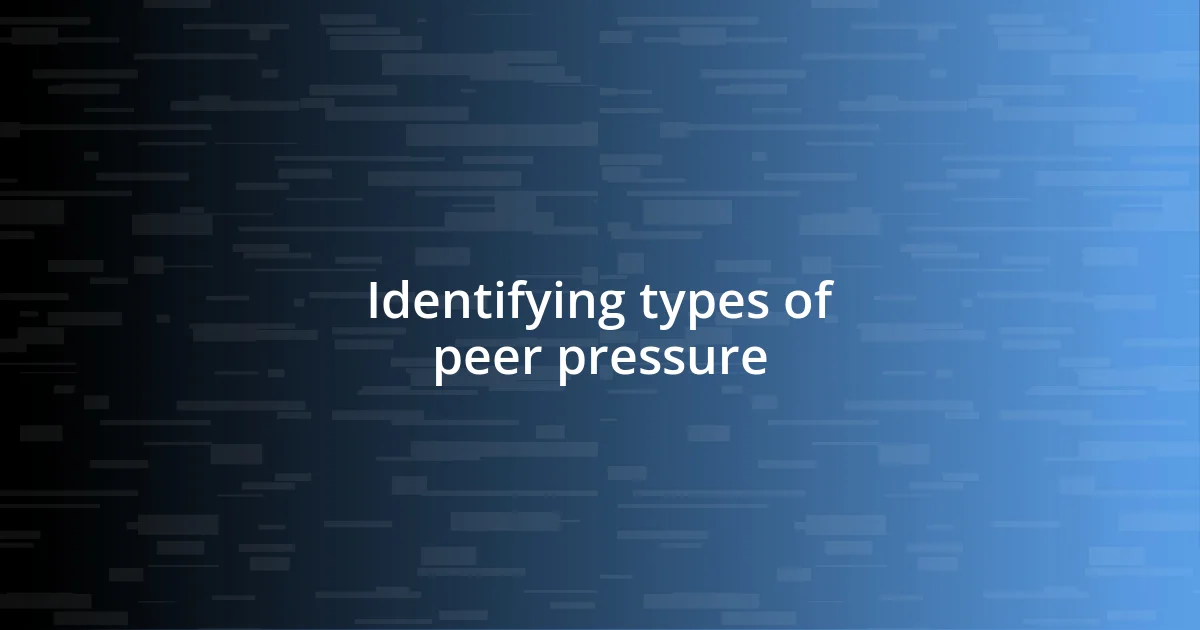
Identifying types of peer pressure
Identifying the types of peer pressure is essential to understanding how they manifest in our lives. There’s direct peer pressure, where friends explicitly encourage us to partake in certain behaviors, like trying a risky activity or engaging in experimental habits. I remember being pushed to stay out late on a school night, and it felt nearly impossible to say no. On the flip side, there’s also indirect peer pressure, where we feel compelled to conform simply by observing others. It’s remarkable how the slightest shift in what’s considered “normal” among a group can make us rethink our own choices, isn’t it?
A distinct yet often overlooked type is positive peer pressure. This isn’t about succumbing to negative influences; instead, it’s the encouragement to strive for better, like my friends motivating me to join a study group for an important exam. It’s uplifting to recognize how peer pressure can play a dual role—it can either uplift us or drag us down, fundamentally shaping our decisions and self-esteem. That realization really made me reflect on the company I choose to keep.
Finally, we must consider subtle peer pressure, which can be challenging to recognize. It often creeps in through social media or group dynamics, where the fear of not fitting in can drive us to change our behaviors unconsciously. I found myself changing my opinions on music and interests just to align with what my friends liked. It’s a fascinating yet complex web of influences that often goes unnoticed until we take a step back and evaluate our choices.
| Type of Peer Pressure | Description |
|---|---|
| Direct Peer Pressure | Explicit encouragement from peers to participate in certain behaviors. |
| Indirect Peer Pressure | Subtle influence based on observing peers’ behaviors. |
| Positive Peer Pressure | Encouragement to adopt positive behaviors, like studying or exercising. |
| Subtle Peer Pressure | Influence that seeps in through social norms, often felt in social media contexts. |
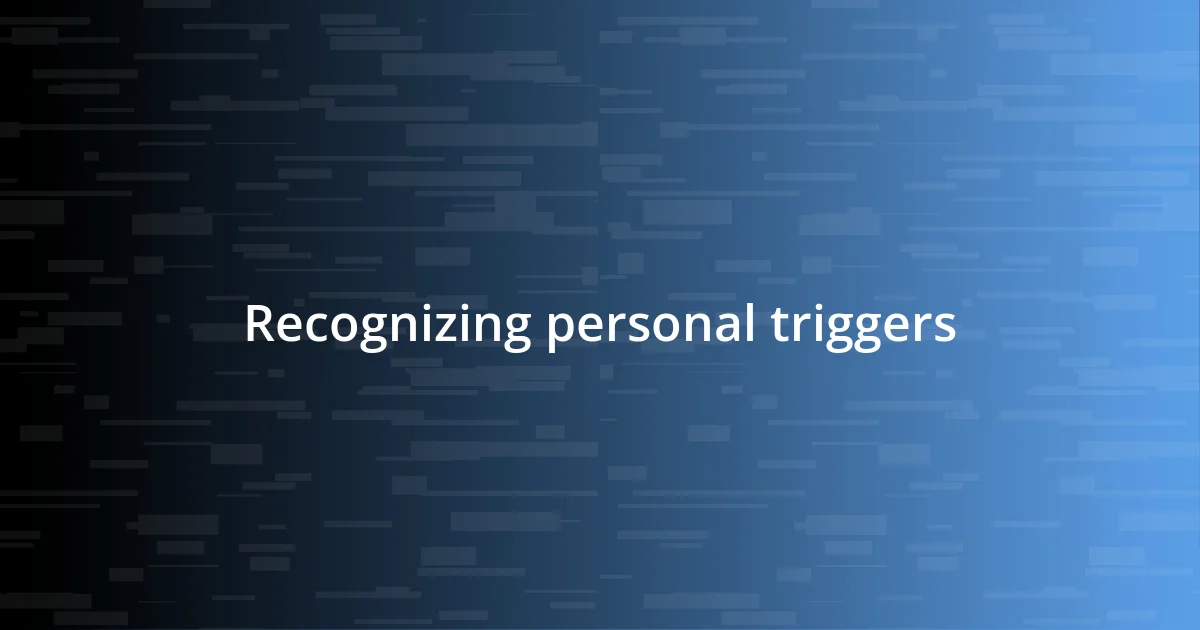
Recognizing personal triggers
Recognizing personal triggers is a vital step in understanding how peer pressure affects us. I remember a time when I would always feel a rush of anxiety every time I heard my friends discussing weekend plans. That sense of urgency crept in, pressuring me to join in, even if I wasn’t interested. Identifying moments like these helps to clarify what specifically prompts my desire to conform, allowing me to establish boundaries.
To better navigate these feelings, I’ve found it helpful to reflect on certain triggers that make me more susceptible to peer pressure:
– Social Settings: Large gatherings where I feel the need to impress others.
– FOMO (Fear of Missing Out): The fear that if I don’t join in, I might miss out on something fun or bonding.
– Emotional States: Feelings of loneliness or insecurity that make acceptance from my peers feel crucial.
– Peer Influence: Friends who unapologetically go for what they want, which can sometimes make me feel inadequate if I don’t follow suit.
By recognizing these triggers, I’ve been able to better analyze why I might feel the urge to conform at times. It’s empowering to know that awareness can help me make decisions grounded in my values rather than in a moment’s impulse.
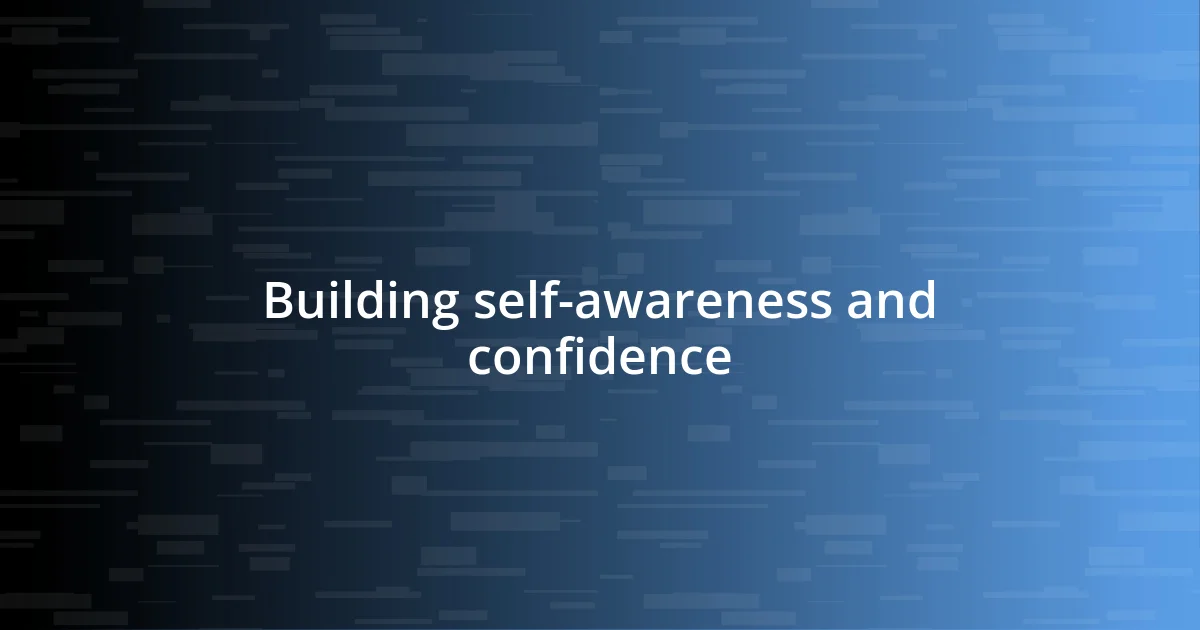
Building self-awareness and confidence
Building self-awareness is like turning on a light in a dim room; it illuminates the paths we might otherwise overlook. I once found myself at a party, surrounded by friends who were all drinking. I felt this intense pull to join in, but taking a moment to pause and reflect on my own values helped me realize that I didn’t want to drink just to fit in. Have you ever experienced that moment of clarity when you realize what truly resonates with you, rather than what others expect? It’s an eye-opening experience that fosters genuine confidence.
Confidence comes from understanding who we are at our core. One of my favorite techniques is journaling my thoughts and feelings. I often write about the choices I make and the reasons behind them. Reflecting on past decisions has revealed patterns in my behavior, like the times I compromised my own preferences for the sake of approval. It surprised me to realize how often I had trivialized my own opinions. This practice not only grounds me—reminding me to uphold my values—but it also boosts my self-assurance, encouraging me to speak up when I need to.
Cultivating self-awareness and confidence is an ongoing journey. I remember attending a workshop focused on self-discovery, where we discussed what makes us unique. It struck me how many insecurities I had about being different. Embracing those differences, however, became a turning point for me. Why should I diminish my individuality to fit into a mold? My quirks became my strengths, fueling my confidence and allowing me to stand firm against peer pressure. Isn’t it invigorating to think of our unique traits as superpowers?
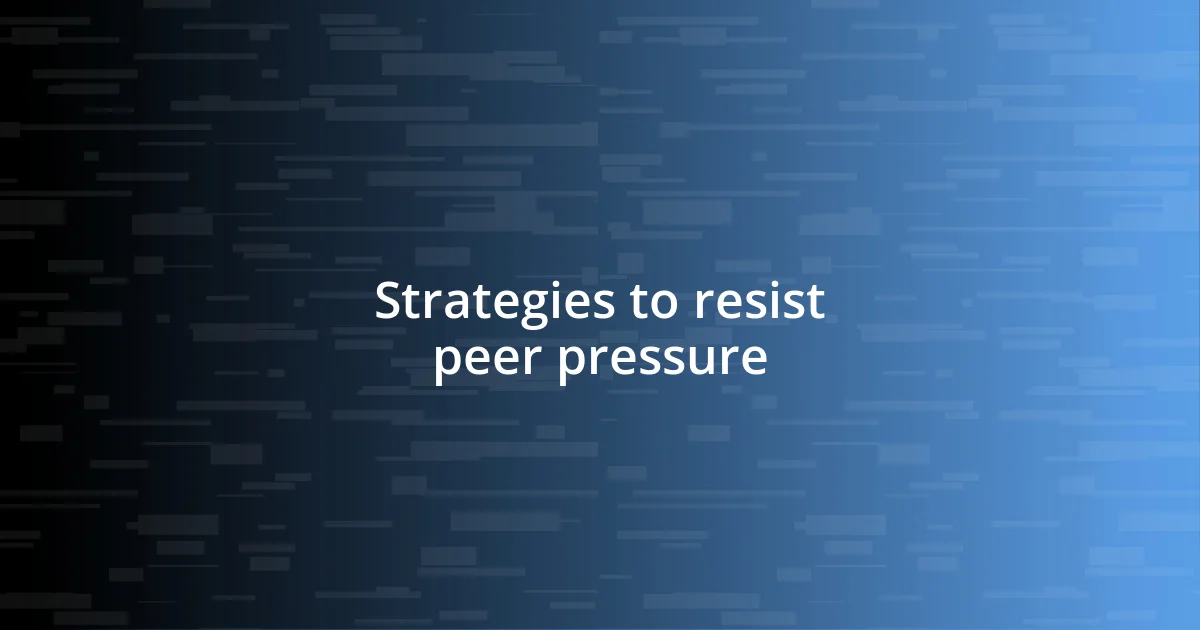
Strategies to resist peer pressure
Finding a supportive friend or mentor can be a game-changer when it comes to resisting peer pressure. I once had a friend who had a knack for defusing tense situations. Whenever I felt cornered into trying something I wasn’t comfortable with, she’d simply take my side with a smile, saying, “Let’s do our own thing instead.” Having someone who could pivot the focus made it easier for me to stand firm in my choices. Have you ever experienced that relief when someone not only understands your perspective but actively supports it? It’s amazing how a little encouragement can bolster your resolve.
Practicing assertiveness is another effective strategy I’ve embraced. I learned early on that saying “no” doesn’t have to be an explosive confrontation; it can be gentle yet firm. For example, during a sports event, my teammates were all gearing up for a major party that felt overwhelming. Instead of hesitating, I just said, “Thanks for the invite, but I’ll pass this time.” Surprisingly, my simple honesty opened up a dialogue about others feeling similar pressure. Isn’t it freeing to know that being direct can lead to deeper connections rather than isolating you?
Lastly, setting clear personal values can serve as your guiding compass in tricky situations. I’ve developed a personal mission statement that outlines what matters most to me. This practice helps create a mental checklist whenever peer pressure arises. If I’m faced with a decision that clashing with my values—like compromising my health just for fun—I take a step back. I often ask myself, “Will this decision align with my long-term goals?” Reflecting on this helps me prioritize what truly enriches my life. Isn’t it comforting to have a framework to guide you through challenging social dynamics?
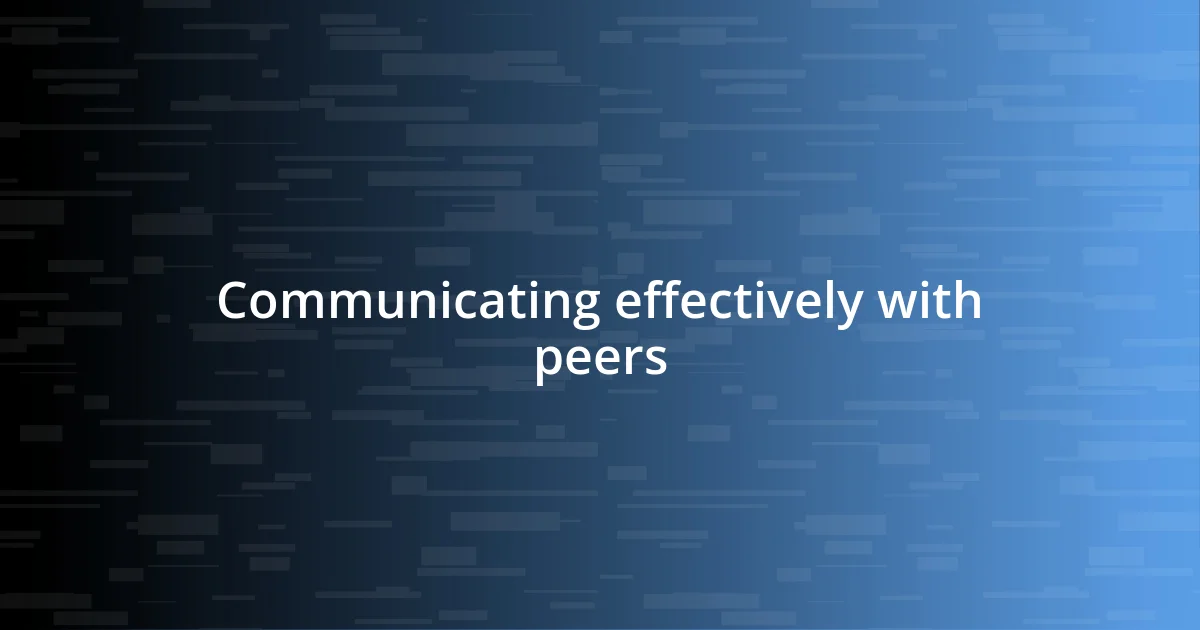
Communicating effectively with peers
Communicating effectively with peers begins with active listening. I remember a group project where everyone had strong opinions, and the conversation quickly became chaotic. Instead of jumping in with my own thoughts, I focused on understanding each person’s perspective. Taking that time to listen not only created a calmer environment but also made everyone feel valued. Have you noticed how listening genuinely fosters a sense of respect among peers?
Being clear and concise in your communication can make a significant difference. I once had a misunderstanding with a close friend about our weekend plans because I spoke too vaguely about my availability. After that, I learned to express my thoughts more clearly. For instance, now, instead of saying “I might be around,” I confidently state, “I am free between 2 PM and 4 PM.” This clarity not only minimizes confusion but also strengthens my interactions. Isn’t it refreshing to know that a small shift in how we express ourselves can lead to more effective conversations?
Non-verbal cues play an equally important role in effective communication. I distinctly recall a situation where I was discussing an idea with a colleague, and while my words were positive, my body language was closed off. That moment taught me how vital it is to match my words with open gestures and eye contact. When I adjusted my posture to be more welcoming, the energy shifted instantly. It made me realize how our bodies often communicate our feelings even before our words do. Have you noticed how a simple smile or nod can change the entire tone of a dialogue? Observing these subtle but powerful signals can enhance our peer interactions immensely.
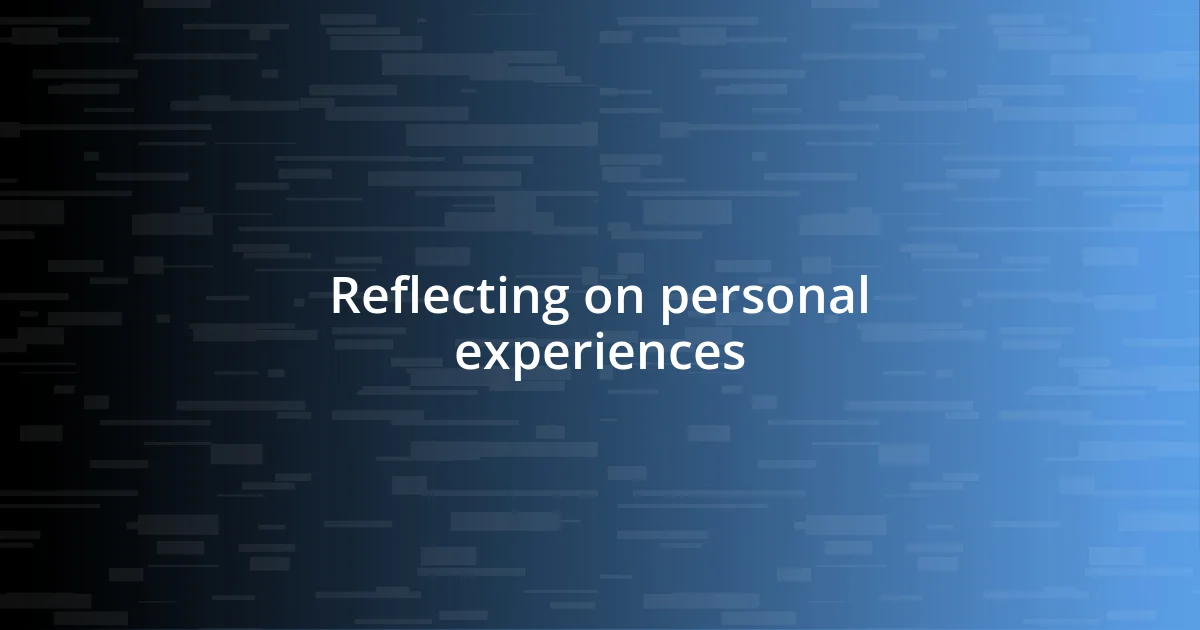
Reflecting on personal experiences
Reflecting on my personal experiences with peer pressure, I remember a time in high school when the allure of fitting in led me to consider skipping class with friends. Looking back, the conflict inside me was palpable. I felt the thrill of rebellion, yet a strong part of me resisted, realizing that my future mattered more than a fleeting moment of acceptance. Have you ever felt torn between two paths? That moment of hesitation was a valuable lesson about the importance of staying true to oneself.
There was another instance at a college party where everyone started drinking, and the pressure was palpable. I remember clutching my drink, feeling all eyes on me as I contemplated whether to join in. Instead, I took a deep breath and loudly declared, “I’m sticking with my soda tonight.” The surprised glances quickly turned into nods of respect from those around me. It surprised me how taking a stand inspired others to reconsider their choices too. Can you recall a moment when standing your ground unexpectedly changed the dynamic?
One experience that remains etched in my memory is when my friends pressured me into wearing certain styles to fit in with what was “cool.” I felt utterly uncomfortable and lost in those clothes that didn’t reflect who I was. Eventually, I chose comfort over conformity, opting for my usual laid-back look instead. The relief was palpable! I realized that embracing my individuality was far more empowering than following trends. Have you ever felt that wave of freedom when you finally let go of external expectations? It’s a reminder that true confidence comes from within.

